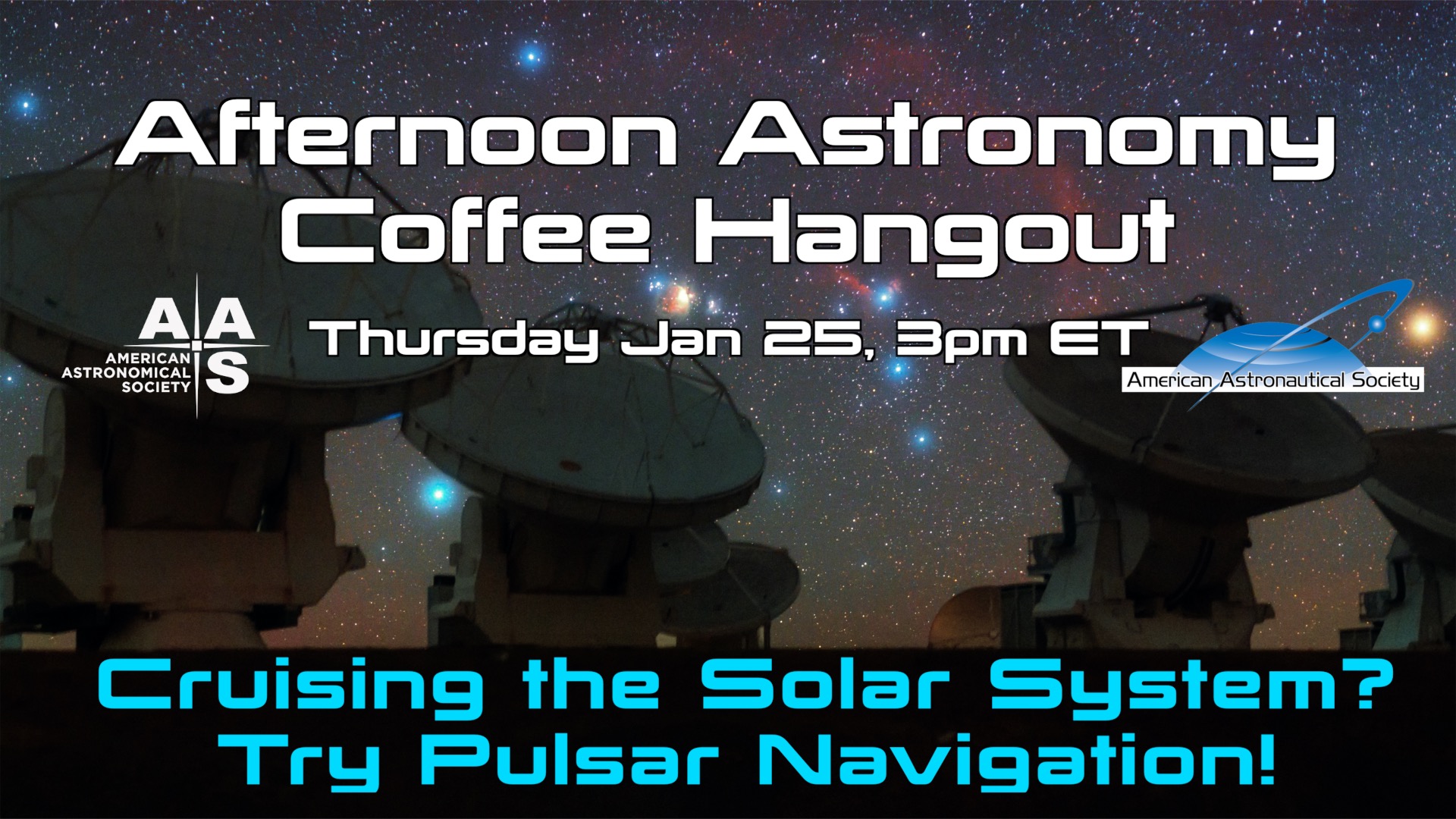Afternoon Astronomy Coffee Hangout 25 January
Carol Christian STScI
"Cruising the Solar System? Try Pulsar Navigation!"
Satellites must have a means to navigate in order to be useful for science, communications, and technology. Once satellites move away from the proximity of Earth and travel through the solar system, and perhaps beyond, they need an accurate system to determine their location. This is currently done by communicating with facilities on or near Earth. Now spacecraft navigation could be possible using the stars, specifically pulsars. These rapidly spinning objects, produced as the end stage of massive stars, give off very regular pulses that can be detected and used to pinpoint a spacecraft's location. This technique has been tested and could prove to be a new way to steer through space. Note that the Voyager spacecraft carry a map that pinpoints Earth relative to several known pulsars!
Join regular hosts Tony Darnell and Carol Christian during Afternoon Astronomy Coffee on Thursday, 25 January 2018, at 3:00 pm Eastern Standard Time as they discuss with Zven Srzoumanian, Keith Gendreau, Jason Mitchell, and Luke Winternitz of NASA's Goddard Space Flight Center the recent demonstration of this technique along with interesting science results from the NICER instrument aboard the International Space Station (ISS).
During the hangout, you can take part in the live chat and join the conversation on Twitter with #AstroCoffee. An archive of previous hangouts in this series may be found in the Deep Astronomy YouTube playlist.

What Are "Afternoon Astronomy Coffee" and "Future in Space" Hangouts?
"Future In Space” and "Afternoon Astronomy Coffee" Hangouts are part of a weekly series, held every Thursday, that also includes a segment called "Footsteps to Mars." We bring the the latest research in astronomy, highlights from the future of space astronomy and astronautics planning, as well as updates on the exploration of Mars to you every week via Hangouts on Air. With the sponsorship of both the American Astronomical Society (AAS) and the American Astronautical Society (the other AAS), our hosts Tony Darnell, Carol Christian, Alberto Conti, and Harley Thronson examine today's breakthroughs in research and peer into the unfolding possibilities of what we may learn about the universe and Mars exploration. We join with members of the American Astronomical Society to chat, in an informal online setting modeled after "science coffee" events held in universities and research organizations across the country. We will examine what we hope to learn about exoplanets, black holes, the early universe, quasars, and life in the universe along with what technologies might help us — and reflect upon the scientific endeavors occurring today that uncover amazing astrophysics and lay the groundwork for studies to come.
We will also explore the technology and engineering used today as well as possibilities for future space travel and research with members of both societies, and probe what our future in space may look like and how we might get there. We will examine the underlying technologies of space telescopes, orbiters, landers, and human space vehicles now and in the years to come. We will delve into topics that help us understand the possibilities and limitations of human space flight and eventual human colonization of other worlds.
We hope you can join us each month as we bring experts from both societies — people who think about and plan for our future in space — to your computer, tablet, or smartphone. We invite you to bring your questions and comments and get ready to learn about the amazing possibilities for the future of space astronomy and exploration.

